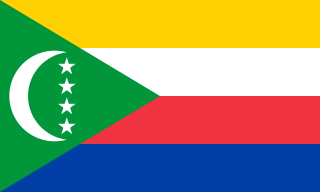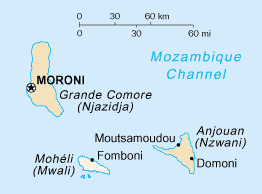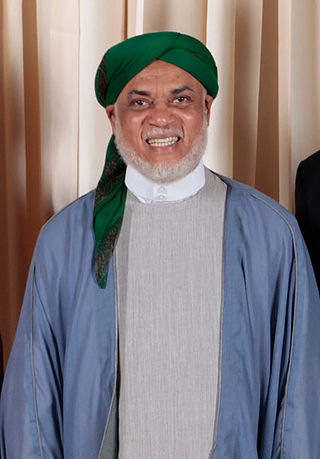Background
The first presidential elections held under the new constitution were conducted on 10 March and 14 April 2002. In the 10 March primary held on the island of Grande Comore, Azali Assoumani finished first out of a field of nine candidates with 39.81% of the vote. Mahamoud Mradabi and Saïd Ali Kemal also qualified to participate in the second round, obtaining 15.69% and 10.68%, respectively. However, Mradabi and Kemal alleged that irregularities had occurred during the primary and decided to boycott the 14 April poll. As a result, Azali Assoumani won approximately 80% of the vote.
A total of fourteen candidates were cleared to participate in the 2006 primaries by the country's constitutional court. However, one of the approved candidates, Antoy Abdou, withdrew prior to election day.

The Comoros, officially the Union of the Comoros, is an archipelagic country made up of three islands in Southeastern Africa, located at the northern end of the Mozambique Channel in the Indian Ocean. Its capital and largest city is Moroni. The religion of the majority of the population, and the official state religion, is Sunni Islam. Comoros proclaimed its independence from France on 6 July 1975. The Comoros is the only country of the Arab League which is entirely in the Southern Hemisphere. It is a member state of the African Union, the Organisation internationale de la Francophonie, the Organisation of Islamic Co-operation, and the Indian Ocean Commission. The country has three official languages: Shikomori, French and Arabic.
The history of the Comoros extends back to about 800–1000 AD when the archipelago was first inhabited. The Comoros have been inhabited by various groups and sultanates throughout this time. France colonised the islands in the 19th century, and they became independent in 1975.

The Politics of the Union of the Comoros take place in a framework of a unitary presidential republic, whereby the President of the Comoros is both head of state and head of government, and of a multi-party system. Executive power is exercised by the government. Legislative power is vested in both the government and parliament. The precolonial legacies of the sultanates linger while the political situation in Comoros has been extremely fluid since the country's independence in 1975, subject to the volatility of coups and political insurrection.

Anjouan is an autonomous volcanic island in the Comoro Islands in the southwestern Indian Ocean, part of the Union of the Comoros. It is known in Shikomori as Ndzuani, Ndzuwani or Nzwani, and, until the early twentieth century when the name fell out of general use, in English as Johanna. Historically it was also called Hinzuan or Hanzoan.

Azali Assoumani is a Comorian politician and military officer who has served as the President of the Comoros from 2002 to 2006 and again since 2016, except for a brief period in 2019. He became head of state after staging a coup d'état in 1999 and was elected president in 2002, 2016, 2019 and 2024. He also served as Chairperson of the African Union from February 2023 to February 2024. Assoumani's current presidency has been described as increasingly authoritarian.

Parliamentary elections were held in the Comoros on 18 April 2004, with a second round on 25 April. The result was a victory for the Camp of the Autonomous Islands, which won 12 of the 18 elected seats.

Mohéli, also known as Mwali, is an autonomously-governed island that forms part of the Union of the Comoros. It is the smallest of the three major islands in the country. It is located in the Indian Ocean off the coast of Africa and it is the smallest of the four major Comoro Islands. Its capital and largest city is Fomboni.

Elections in the Comoros take place within the framework of a multi-party democracy and a presidential system. The President and the majority of the seats in the Assembly of the Union are directly elected.

Sayyid Ahmed Abdallah Mohamed Sambi is a Comorian Islamic leader and politician, and former President of Comoros. He is popularly known as 'Ayatollah'. After easily winning the 14 May 2006 presidential election with 58.02% of the national vote, Sambi was inaugurated as President of the Union of the Comoros on 26 May 2006. It was the first peaceful transfer of power in the history of the Comoros.
Ibrahim Halidi was a long-time politician in Comoros. Halidi was the Prime Minister of Comoros from January to May 1993. Halidi also ran for president in May 2006 with the backing of the outgoing president, Azali Assoumani. In the first round of the election, Halidi finished in third place with 10.37% and qualified for the presidential second round, which was held on 14 May. Halidi lost the presidential election to Ahmed Abdallah Sambi. Ibrahim Halidi was supported by the Islands' Fraternity and Unity Party (CHUMA), Convention for the Renewal of the Comoros (CRC), Movement for the Comoros (MPC) and the Djawabu Party (DJAWABU).

Presidential elections were held in the Comoros on 7 November 2010, with a second round on 26 December, alongside gubernatorial elections for the three main islands. The result was a victory for Ikililou Dhoinine, who received 61% of the vote.

Presidential elections were held in the Comoros in 2002. In accordance with the new constitution approved in a referendum the previous year, the island of Grande Comore was to provide the candidates for this election as part of a rotation agreement between the three islands. A first round was held on Grande Comore on 17 March, after which the top three candidates, Azali Assoumani, Mahamoud Mradabi and Saïd Ali Kemal went through to a second, national round of voting on 14 April. However, both Mradabi and Kemal boycotted the second round, leaving Assoumani as the only candidate.

Presidential elections were held in the Comoros on 21 February 2016, with a second round to be held on 10 April 2016, alongside elections for the Governors of the three islands. A re-run of the second round was held in thirteen constituencies on Anjouan on 11 May. Azali Assoumani of the Convention for the Renewal of the Comoros was elected President with 41% of the vote.

The Islands' Fraternity and Unity Party is a political party in the Comoros.

The National Rally for Development was a political party in the Comoros.

Early presidential elections were held in the Comoros on 24 March 2019 alongside regional elections. A second round would have been held on 21 April if required, but incumbent President Azali Assoumani was re-elected in the first round of voting.

Parliamentary elections were held in the Comoros on 19 January 2020; in constituencies where no candidate received a majority, a second round was held alongside local elections on 23 February. The elections were boycotted by the main opposition parties, including the two largest parties in the outgoing Assembly, the Union for the Development of the Comoros and Juwa Party, in protest at constitutional reform and political repression, The result was a landslide victory for President Azali Assoumani's Convention for the Renewal of the Comoros, which won 20 of the 24 elected seats.
Said Ali Kemal was a Comorian politician. He was the son of Prince Saïd Ibrahim Ben Ali and the grandson of Sultan Said Ali bin Said Omar of Grande Comore.

Presidential elections were held in the Comoros on 14 January 2024. Election officials initially announced on 16 January that incumbent president Azali Assoumani had been re-elected with 63% of the vote, with a voter turnout of just 16%. However, the Supreme Court approved a set of results that showed Assoumani receiving 57% of the vote, with voter turnout at 56%.
The 1999 Comorian coup d'état was a two-day long bloodless military takeover in the Comoros led by Colonel Azali Assoumani from April 29 to April 30, resulting in the overthrow of interim president Tadjidine Ben Said Massonde. The coup was ostensibly carried out to restore order and prevent further attacks on Anjouanese residents in Grande Comore amid the country's secession crisis involving the islands of Anjouan and Mohéli.









